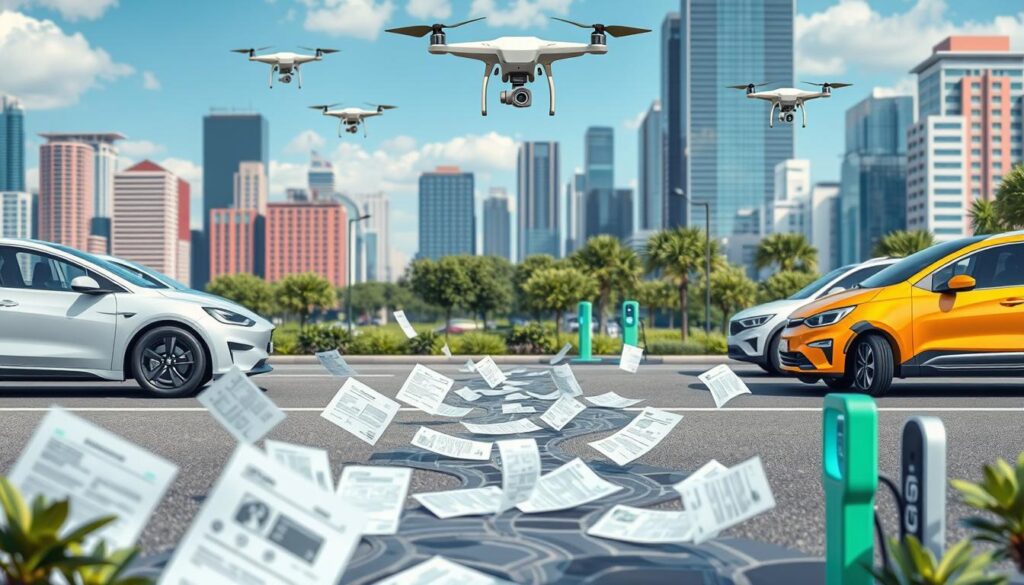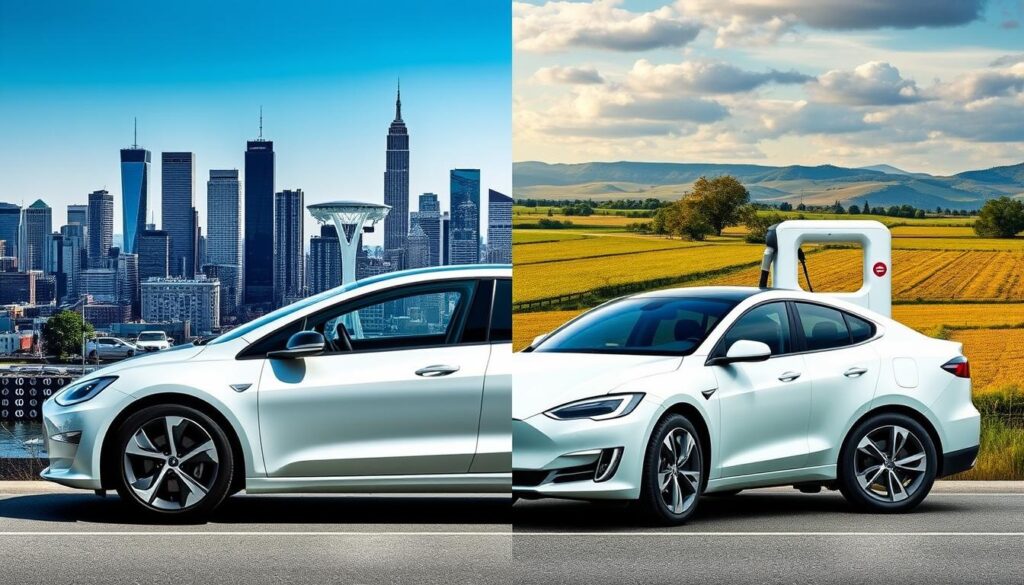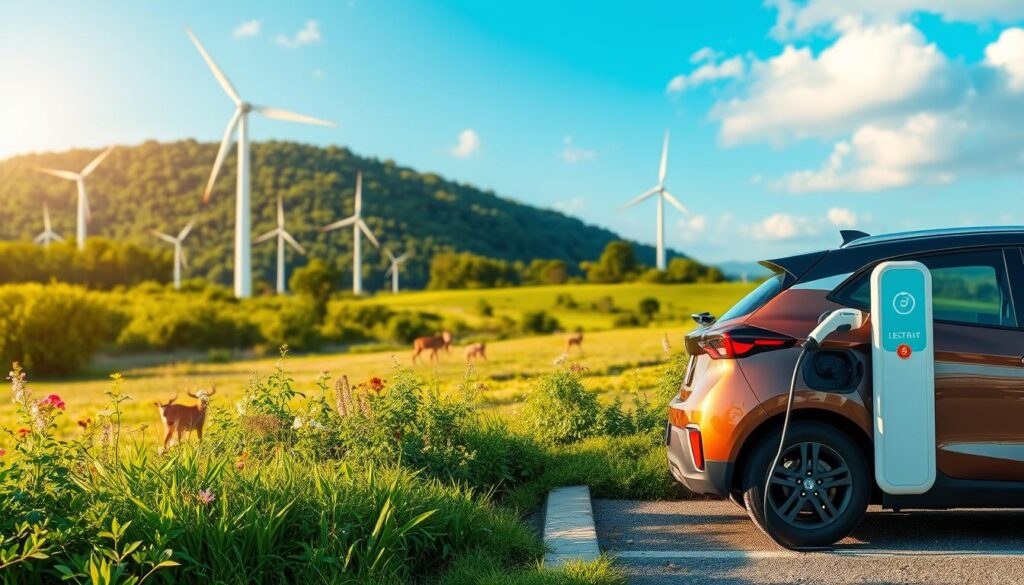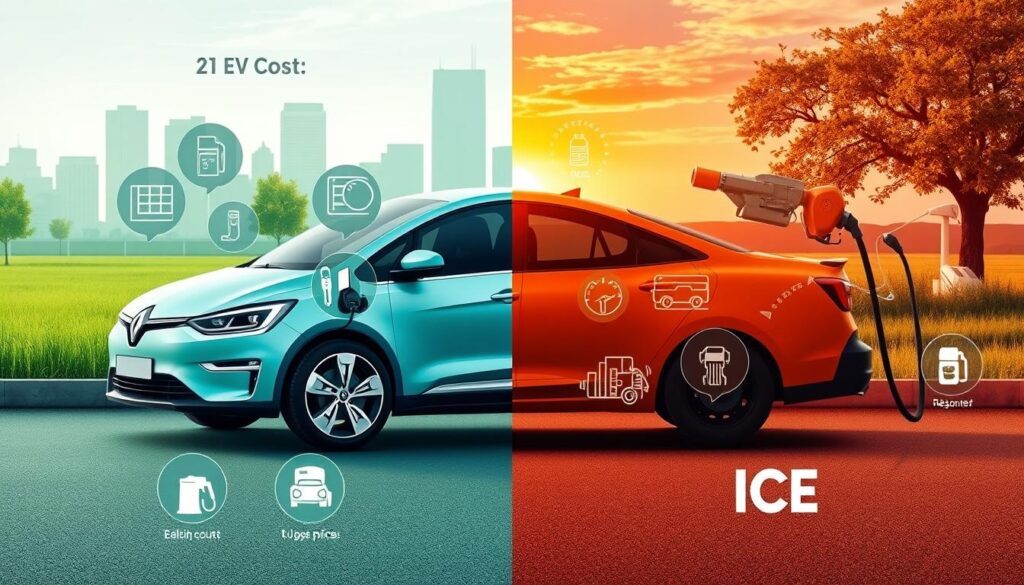When choosing between an electric vehicle (EV) and a gas-powered car, the cost is key. This guide will look at the initial price, monthly costs, maintenance, and long-term savings. It aims to help you decide which is best for you.
The EV world has grown a lot, thanks to better batteries and more charging spots. But, choosing an EV isn’t just about the planet. It’s also about the money you’ll spend owning and driving one. By the end, you’ll know the cost differences and pick the best choice for your wallet and driving habits.
In This Guide
Understanding Initial Purchase Price Differences
When looking at electric vehicles (EVs) and gas cars, the first cost is key. EVs might cost more upfront, but there are incentives and rebates to help. These can make the initial cost lower.
New Electric Vehicle Base Prices
EV prices vary, from about $30,000 to over $65,000. This depends on the brand, battery size, and extra features. For example, the Nissan Leaf starts at $27,400, while the Tesla Model Y begins at $54,990.
Comparable Gas Vehicle Price Points
Let’s compare gas cars to EVs. The Honda Civic starts at $22,700, and the Toyota RAV4 at $27,575. These gas cars are priced similarly to EVs.
Available Tax Incentives and Rebates
Tax credits and rebates can lower EV costs. The federal government offers up to $7,500 in tax credits. States like California also provide rebates, up to $2,000 for EVs.
| EV Model | Base Price | Federal Tax Credit | Net Price After Incentive |
|---|---|---|---|
| Nissan Leaf | $27,400 | $7,500 | $19,900 |
| Tesla Model Y | $54,990 | $7,500 | $47,490 |
With tax incentives and rebates, EVs become more affordable. This makes them a good choice for many buyers.
Electric vs Gas Car Cost: Monthly Operating Expenses
When we look at the costs of electric vehicles (EVs) and gas cars, monthly expenses are key. The first cost, the purchase price, is different. But the ongoing costs can really affect how much you spend over time.
For EVs, the main monthly cost is electricity for charging. This can change based on where you live and how much you drive. Gas cars, on the other hand, have monthly fuel costs that can go up and down with gas prices. Both need regular maintenance, like oil changes and tire rotations, which add to their monthly costs.
| Cost Category | Electric Vehicle | Gas-Powered Vehicle |
|---|---|---|
| Energy Costs | Electricity for charging | Gasoline |
| Maintenance | Fewer moving parts, generally lower maintenance costs | Traditional maintenance schedules, potentially higher costs |
| Potential Savings | Lower EV running costs due to energy efficiency and reduced maintenance | Higher gas car monthly expenses due to fuel and maintenance |
Looking closely at the vehicle operating costs of EVs and gas cars helps you choose wisely. It’s about finding what fits your budget and driving habits.
Charging Costs vs Fuel Expenses
When we look at the costs of electric vehicles (EVs) and gas cars, we must consider charging and fueling costs. Home charging and public stations are key to EV costs. They affect how much you spend on an EV over time.
Home Charging Infrastructure Costs
EVs can be charged at home, saving money compared to gas cars. But, setting up a home charger costs money. Prices range from a few hundred to over a thousand dollars. These costs are part of owning an EV.
Public Charging Station Rates
Public charging stations are great for long trips or when you can’t charge at home. Prices vary, with some being free or cheap. Knowing these costs helps estimate EV charging expenses.
Current Gas Prices and Consumption Rates
Gas car costs depend on gas prices, which change often. The national average is $4.50 per gallon. Fuel efficiency also affects costs over time.
| Metric | EV Charging | Gas-Powered Vehicle |
|---|---|---|
| Typical Home Charging Cost | $0.13 per kWh | N/A |
| Average Public Charging Rate | $0.25 per kWh | N/A |
| Current National Average Gas Price | N/A | $4.50 per gallon |
| Fuel Efficiency | 4.0 miles per kWh | 25 miles per gallon |
Understanding both EV and gas car costs helps you choose wisely. It’s about matching your choice to your budget and driving habits.
Insurance and Registration Considerations
When you look at electric vehicles (EVs) and gas cars, costs go beyond the price you pay at first. Insurance and registration fees can differ a lot. It’s key to know these costs to figure out the total cost of owning a car.
EV insurance rates are often higher than for gas cars. This is because EVs cost more to fix and need special skills for service. Meanwhile, gas car registration fees might be pricier, depending on the engine size or weight of the car.
| Expense | Electric Vehicle | Gas-Powered Vehicle |
|---|---|---|
| Vehicle Insurance Costs | Higher due to repair costs and specialized expertise | Lower, as repair and service are more common and affordable |
| Registration Fees | Vary by location, may be lower in some areas | Can be higher, often tied to engine size or weight |
To understand the vehicle insurance costs and registration fees, check your local rules and rates. This will help you decide wisely and compare the costs of owning an EV versus a gas car.

Maintenance and Repair Cost Analysis
When you own a vehicle, maintenance and repair costs are key. Electric vehicles (EVs) and gas cars differ in upkeep needs. This affects your wallet in unique ways.
EV Battery Replacement Expenses
EVs raise concerns about battery replacement costs. Modern EV batteries last many years but may need replacing. A new EV battery costs between $3,000 and $15,000, based on the model and size.
But, many car makers offer long warranties on EV batteries. This gives owners peace of mind and protects their wallet.
Traditional Vehicle Service Schedules
Gas cars need regular care, like oil changes and tire rotations. These services can increase your yearly costs. The average annual maintenance for a gas car is $500 to $1,000 or more, depending on the car and how you drive.
Parts Replacement Frequency
- EVs usually cost less to maintain than gas cars because they have fewer parts and simpler systems.
- But, replacing EV parts like electric motors or charging systems can be pricier than traditional car parts.
- Gas cars often need more frequent part replacements, like spark plugs and belts. This increases maintenance costs.
When choosing a vehicle, consider the long-term maintenance and repair costs. Knowing the differences between EVs and gas cars helps you make a budget-friendly choice.
Depreciation Rates and Resale Value
Understanding the depreciation rates and resale value of electric vehicles (EVs) versus gas cars is key. EVs might cost more upfront, but their depreciation can affect the total cost over time. This is important for anyone thinking about buying a car.
EVs usually depreciate faster than gas cars. This is because battery tech advances quickly and the EV market changes fast. But, as EVs become more common and battery costs drop, their depreciation rates will slow down. This makes EVs more appealing for keeping their value over time.
| Vehicle Type | 3-Year Depreciation Rate | 5-Year Resale Value |
|---|---|---|
| Electric Vehicle | 40-60% | 40-50% |
| Gas-Powered Vehicle | 30-50% | 50-60% |
The car’s condition, mileage, and demand also affect its resale value. Cars that are well-kept and have low mileage hold their value better. This is true for both EVs and gas cars.
As the EV market grows, keeping up with depreciation and resale trends is crucial. This helps you make a smart choice between an electric or gas car.

Long-Term Cost Savings Breakdown
Looking at the long-term costs of electric vehicles (EVs) and gas cars shows big savings. A five-year comparison, break-even analysis, and cost calculator help understand EV financial benefits. This makes EVs a better choice than traditional gas cars.
Five-Year Ownership Comparison
Over five years, EVs cost less than gas cars. This is because EVs have lower fuel and maintenance costs. Plus, there are tax breaks and rebates. A study found that Americans could save $6,000 to $10,000 by choosing an EV.
Break-Even Point Analysis
The break-even point is key when comparing EV vs gas car savings. It’s when the EV’s higher price is balanced by long-term savings. Depending on your driving and location, this can happen in 2-3 years. This makes EVs a smart choice for the long run.
Total Cost of Ownership Calculator
Many websites and car makers offer vehicle ownership costs calculators. These tools consider purchase price, fuel, maintenance, insurance, and depreciation. They help you see the cost comparison calculator between EVs and gas cars. Using these calculators helps you choose the best option for your budget and future.
Environmental Impact and Carbon Footprint
Electric vehicles (EVs) and traditional gas cars have different environmental impacts. EVs are better for the planet because they use electricity instead of gasoline. This makes them a greener choice.
EVs are more energy-efficient and can run on clean, renewable electricity. They don’t produce direct emissions, which helps keep the air clean and reduces carbon footprint. On the other hand, gas cars pollute with carbon dioxide, nitrogen oxides, and particles. These pollutants harm the environment and our health.
| Metric | Electric Vehicles | Gas-Powered Vehicles |
|---|---|---|
| Greenhouse Gas Emissions | Zero direct emissions | Significant emissions from combustion of gasoline |
| Energy Efficiency | Higher energy efficiency, converting up to 77% of the electrical energy from the grid to power the wheels | Lower energy efficiency, with only 12-30% of the energy from gasoline converted to power the wheels |
| Environmental Impact | Reduced air pollution and noise levels, lower carbon footprint | Contribute to air pollution, greenhouse gas emissions, and environmental degradation |
The benefits of EVs are clear, but their environmental impact also depends on the electricity source. Using renewable energy like solar, wind, or hydropower makes EVs even better for the planet. Improvements in battery tech and a cleaner grid will make EVs even more eco-friendly in the future.

“The transportation sector is one of the largest contributors to global greenhouse gas emissions. Transitioning to electric vehicles is a crucial step in mitigating climate change and achieving a more sustainable future.”
Future Market Trends and Cost Projections
The car world is changing fast. We need to look at the future of electric and gas cars. The EV market trends and gas prices forecast will shape the future of the automotive industry.
Battery Technology Advances
Better batteries are making electric cars cheaper. Scientists are working hard to make batteries more efficient and faster to charge. These improvements will lower the cost of making EVs, making them more affordable.
Fuel Price Forecasts
Gas prices are also important. Right now, gas prices affect how much it costs to own a gas car. But, prices might change in the future. This could make electric cars even more appealing because they use electricity instead of gas.
As these changes happen, electric cars might become even more cost-effective. Knowing about EV market trends and gas prices forecast helps you choose the best car for your money.
“The future of the automotive industry is electric, and the cost savings associated with EVs will only continue to grow as technology advances and fuel prices fluctuate.”
Conclusion
Looking at the electric vs gas car cost comparison shows it’s a tough choice. It depends on your needs, money, and what you care about the environment. EVs might cost more upfront, but they save money in the long run. This is thanks to lower fuel and maintenance costs, plus tax breaks and rebates.
Whether to choose an EV or a gas car depends on your driving, where you can charge, and your budget. Knowing the total cost of owning a car helps you decide. This includes monthly costs, insurance, and how much the car will be worth later.
The key is to look at all the details before making a choice. By considering what’s best for you, you can pick a car that fits your needs and cares for the planet.

